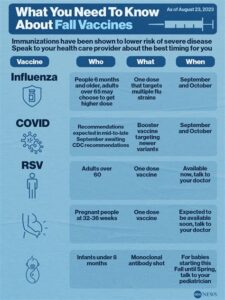Explore the RSV vaccine: understand its benefits, common and rare side effects, and effective management strategies for optimal health.As respiratory syncytial virus (RSV) continues to pose a significant risk, especially to infants and vulnerable populations, the development of the RSV vaccine offers hope for better protection. However, like any vaccine, it’s essential to understand not just its benefits but also its potential side effects. This blog post will delve into the RSV vaccine, exploring its efficacy and the range of possible side effects that individuals might experience. From common reactions that may occur post-vaccination to rare but serious adverse effects, we aim to provide a comprehensive overview. Additionally, we will discuss effective management strategies for any side effects, ensuring that you are well-informed and prepared. Join us as we navigate the intricacies of the RSV vaccine and its implications for health and safety.
Understanding the RSV Vaccine
The RSV vaccine aims to protect against the respiratory syncytial virus (RSV), which is a common virus that can lead to serious respiratory illnesses, particularly in infants and older adults. This vaccine is especially crucial as it helps reduce hospitalizations and severe disease caused by RSV.
The development of the RSV vaccine has been a significant advancement in pediatric and geriatric medicine. Clinical trials have shown that the vaccine is effective in inducing an immune response that can help prevent RSV infection. The usual administration method involves a single injection, and the timing may vary based on age and health conditions.
Understanding the RSV vaccine includes recognizing its potential to not only reduce the incidence of severe RSV but also to provide relief for families who may face the burdens of caring for children or older adults affected by this virus. As research continues, we gain more insight into the efficacy a
Potential Side Effects of RSV Vaccine
The Respiratory Syncytial Virus (RSV) vaccine is a crucial step toward preventing serious infections, especially in vulnerable populations such as infants and older adults. However, like any vaccine, it may have potential side effects that individuals should be aware of before receiving it.
While the body’s immune response is designed to protect against the RSV virus, some individuals may experience mild to moderate side effects post-vaccination.
- Pain or swelling at the injection site – This is one of the most common side effects and typically resolves within a few days.
- Fever – A mild fever may occur as the body learns to recognize and fight the virus.
- Fatigue – Some individuals report feelings of tiredness after the vaccination.
- Headache – A slight headache can occur but usually resolves quickly.
- Nausea – A few people may experience nausea, which is generally temporary.
Most side effects are self-limiting and resolve on their own without the need for medical intervention. Nevertheless, it is vital for individuals to monitor their health after receiving the RSV vaccine and to consult a healthcare provider if they have any concerns.
Understanding the potential side effects is vital not only for personal health but also for encouraging vaccination within the community. Being informed can help alleviate fears and promote a higher acceptance of the RSV vaccine, ultimately contributing to public health goals.
Common Side Effects After RSV Vaccine
The RSV vaccine has been gaining attention as a significant advancement in the fight against respiratory syncytial virus. While many individuals experience positive outcomes from this vaccine, it is essential to be aware of the common side effects that may occur after vaccination.
Individuals may encounter several mild reactions following the administration of the RSV vaccine.
- Pain at the injection site: Many recipients report soreness, swelling, or redness where the vaccine was administered.
- Fatigue: A feeling of tiredness is a common experience post-vaccination.
- Headache: Some individuals may develop headaches after receiving the vaccine.
- Muscle aches: Generalized muscle pain can also occur as the body responds to the vaccine.
- Fever: Low-grade fever is another typical side effect as the body builds immunity.
These side effects are generally mild and resolve on their own within a few days. Nevertheless, it is crucial to monitor one’s health following vaccination and consult
Rare but Serious Side Effects
While the RSV vaccine is generally safe and effective in preventing respiratory syncytial virus infections, it is important to be aware of the rare but serious side effects that, although uncommon, may occur. These side effects can vary in severity and may require medical attention.
- Anaphylaxis: A serious allergic reaction that can cause difficulty breathing and swelling of the face and throat.
- Guillain-Barré Syndrome: A rare neurological disorder where the body’s immune system mistakenly attacks the nerves, leading to weakness and sometimes paralysis.
- Myocarditis: Inflammation of the heart muscle which can lead to chest pain, heart failure, or arrhythmias.
It is crucial for individuals receiving the RSV vaccine to monitor for these serious side effects and seek immediate medical care if they notice symptoms related to any of the conditions listed above. Discussing these risks with a healthcare
Managing Side Effects of RSV Vaccine
Receiving the RSV vaccine is a crucial step in protecting yourself and vulnerable populations from respiratory syncytial virus. However, like all vaccines, it may cause some mild to moderate side effects. It’s important to manage these side effects effectively to ensure a smooth recovery.
- Rest: Make sure to get plenty of rest to allow your body to recover and produce an immune response.
- Hydration: Drink plenty of fluids to stay hydrated, especially if you experience fever or other systemic symptoms.
- Over-the-counter medications: Consider using over-the-counter pain relievers such as acetaminophen or ibuprofen to alleviate pain or fever.
In case of severe side effects or any concerning symptoms, it’s essential to contact a healthcare professional immediately. Being informed about these management strategies can enhance your experience with the RSV vaccine and help prevent complications.
Remember, while side effects are a part of the process, the protective benefits of the RSV vaccine
Frequently Asked Questions
What is the RSV vaccine?
The RSV vaccine is designed to protect against the respiratory syncytial virus (RSV), which can cause severe respiratory illnesses in infants, elderly adults, and those with weakened immune systems.
What are common side effects of the RSV vaccine?
Common side effects of the RSV vaccine may include pain at the injection site, mild fever, fatigue, and irritability.
Are there serious side effects associated with the RSV vaccine?
Serious side effects are rare but can include allergic reactions, such as difficulty breathing or swelling, and should be reported to a healthcare provider immediately.
How long do the side effects from the RSV vaccine typically last?
Most side effects from the RSV vaccine are mild and tend to resolve within a few days.
Can the RSV vaccine cause respiratory symptoms?
The RSV vaccine does not contain live virus, so it cannot cause an RSV infection, but some individuals may experience mild respiratory symptoms as a side effect.
Who should consider getting the RSV vaccine?
The RSV vaccine is recommended for infants, young children, and high-risk adults, especially those with underlying health conditions.
What should I do if I experience side effects from the RSV vaccine?
If you experience side effects from the RSV vaccine that concern you or do not subside, it is important to contact your healthcare provider for guidance and management.





